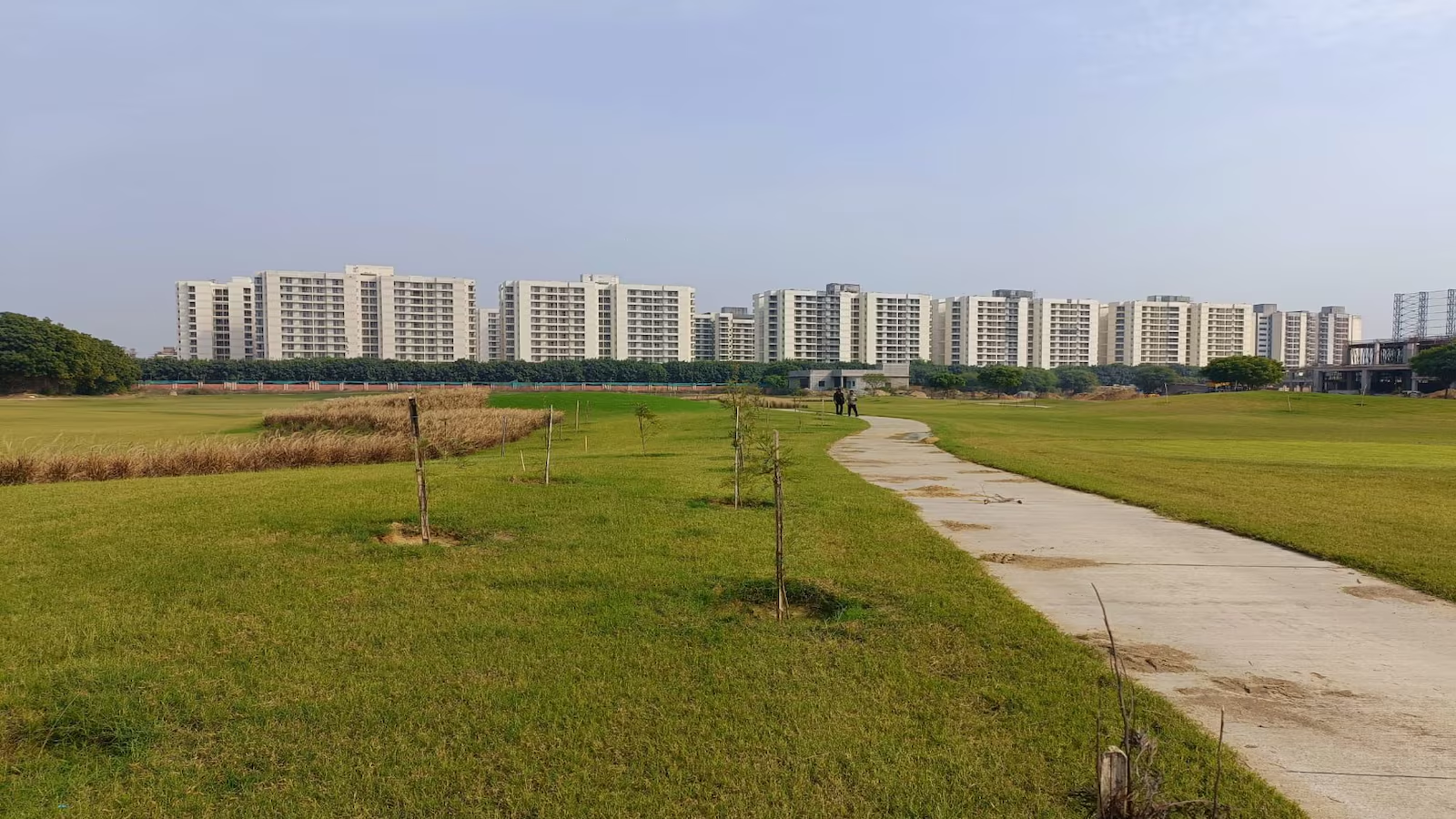Interviews
It’s all-encompassing


But H-RERA Chairman KK Khandelwal tells R&M the Authority adopts pragmatic approach on key aspects


‘Non-registered projects ‘Every order of Authority
also under Act’s ambit’ is like a decree of court’
A Bachelor in Engineering and a doctorate in law, Dr Krishana Kumar Khandelwal is also the proud holder of PG degrees and diplomas in virtually every stream ranging from Psychology, Sociology and Economics to Mass Communication, Public Administration, Business Administration and even Library Science. No doubt, this 1985-batch IAS officer of Haryana cadre is the right person to handle intricacies of a job like that of Chairman of the Haryana Real Estate Regulatory Authority (H-RERA). Besides throwing light on various complex issues involved with the one-year-old regulatory law, a long drawn-out interview with Dr Khandelwal turned out to be a learning experience for Realty & More Editor Palash Roy. In a relaxed manner, Khandelwal explained to Roy the vast ambit of RERA jurisdiction, the distinction between structural and workmanship defects and the parameters involved in deciding interest and compensation. Dr Khandelwal also talked at length about a recent order delivered by H-RERA in a case involving Greenopolis project in Gurugram.
Here follows the text of the interview:
Palash Roy: The jurisdiction of the Authority has become a point of contention particularly the applicability of RERA on projects completed much before it came into effect. How the Act is going to be implemented, for example, in case of a project which has been completed well before RERA, maybe even more than three or four years. Will complaints against such projects also be covered?
KK Khandelwal: The Act does not say anywhere that it is applicable only to the registered real estate projects. It says real estate projects as defined in Clause Z (n), which does not mention real estate projects registered under RERA. It puts certain restrictions – on marketing, booking, selling, or by any other means inducing a person to purchase. All these cannot be done without prior registration of the projects. Registration serves a very limited purpose, that is, the validity of the registration is from commencement to completion. As soon as the project is completed and completion certificate issued, the registration expires.
But there are certain obligations which are applicable on promoters, even after the possession of projects. These are handing over the project by the date promised, getting conveyance deed done, structural defect and workmanship defects liability for five years, and life-long liability for land title defects. The Act does not mention that it is applicable only on RERA-registered real estate projects. It says even to the extent that the promoter shall comply with the obligations as provided in the Act, rules, regulations thereunder and in terms of Agreement to Sale, and that has been very categorically mentioned that even if the Agreement to Sale was entered much before the commencement of RERA.
PR: Do you mean that all projects irrespective of the date of completion will fall under RERA jurisdiction?
KKK: Let me give an example: if a project has been completed, say three months before RERA came into effect and some unsold inventory is also there. Now after three years, there erupt structural or workmanship defects. Will the promoter say he is not liable because the project is not RERA-registered? Where will the buyer go then?
See, there cannot be two set of Authorities for the same issue. If the project is completed before RERA came into effect, the only difference is they are not required to register the project with RERA. Such projects are out of ambit of registration, but not out of the ambit of the Act. Even if it is less than 500- square metre plot, if there is a real estate project and there is a complaint, the allottee has the right to complain to us and we will entertain it.
PR: You are effectively saying that there is no time limit for any project. So if a project is completed 10 years back, then what happens?
KKK: Structural and workmanship defects liability is only for five years. So such nature of complaints will not be entertained for projects completed over five years back. But if a project is completed 20 years back, and now there is a land title defect, then the complainant has the right to come to the adjudicating officer for compensation because of the loss or damage which he has suffered.
PR: Which means for projects completed over five years back, only if there is land title defect the alottee can come to you?
KKK: No, there are other matters also. Suppose in the Agreement to Sale there was no such clause that after ten years the developer will do something which is chargeable. And if he does so, then the buyer can come to us. What I mean is you have to operate only within the four walls of Agreement to Sale, or if the Agreement to Sale is supposed to be one-sided, then wherever provisions have been made under the Act like possession, following the sanctioned lay-out plans and specifications, wherever those provisions are made and they are in contradiction to the provisions of Agreement to Sale, those provisions of Agreement to Sale get abrogated. So, this is our line after detailed consultations with all stakeholders, and we will follow this unless it is termed invalid by the Appellate Authority or High Court.
PR: Can you give more clarity on structural defect and workmanship defect?
KKK: In structural engineering, a structure is defined as something where large number of forces operate and the entity shall be able to withstand those forces. So these are those defects, where a particular building or real estate is not in a position to bear the loads being put on it, which could earthquake, heavy wind pressure or the load of the building. Simply put, structural defect means the structure is not sturdy enough to withstand the forces.
In workmanship, you have to see that the building is workable, for example peeling off of the plaster, etc. Workmanship defect is very stringent and it covers a large number of things and five years is a long period. Now say for example for paint work, five years is a very long period. So, the Authority has to take a pragmatic approach
PR: Recently you have given a crucial judgment in the case of Greenopolis buyers vs promoters. Can you tell us about that judgment?
KKK: This Act aims to promote real estate growth which is necessary for any economy. In this particular project, 50-60 per cent of the project is completed. If at this point of time we allow withdrawal from project then it will affect those who want to stay with the project. Our first aim is that the project should be completed. The license in this case was issued to Orris, which is the landowner. Orris entered into an agreement with Three C, which was not produced before the department.
As per the agreement, the whole construction was to be done by Three C, 70 per cent will be sold by Three C and 30 per cent by Orris. This agreement has got no sanctity with the department but as large number of buyers’ interest is involved, we have to take a pragmatic view. We will do a due diligence to know how much amount is required to complete the project and various ways to arrange the same – by selling unsold inventory, by getting balance money from the allottee or by selling unsold inventory of their other projects. Then, there is 10-acre land left in the project, we can put that up for sale. For all these, we will appoint an auditor, a quantity surveyor and a due diligence firm. Also we will appoint someone who will act as a guardian or monitor of the project.
- Registration serves a very limited purpose, that is, the validity of the registration is from commencement to completion. As soon as the project is completed and completion certificate issued, the registration expires.
- There cannot be two set of Authorities for the same issue. If the project is completed before RERA came into effect, the only difference is they are not required to register the project with RERA. Such projects are out of ambit of registration, but not out of the ambit of the Act.
- Structural and workmanship defects liability is only for five years…But if a project is completed 20 years back, and now there is a land title defect, then the complainant has the right to come to the adjudicating officer for compensation
- As per the agreement (in Greenopolis case), the whole construction was to be done by Three C, 70 per cent will be sold by Three C and 30 per cent by Orris. This agreement has got no sanctity with the department but as large number of buyers’ interest is involved, we have to take a pragmatic view.
- For the compensation part, if there is a disagreement between the buyer and the promoter, then they can come to us. The buyer has to prove the losses which he has suffered due to the delay. He can also cite reasons other than mental agony, harassment, loss due to rent payment, etc.
- In case the allottee wants to continue with the project, he will get the interest for every month of delay at the prescribed rate. Also compensation can be made retrospectively, but penalty cannot be made retrospectively, interest is not penal in nature, it is compensatory.
PR: In case of agreements prior to RERA, how is the interest and compensation element being decided? As in the case of applying interest for period prior to RERA may tantamount to rewriting of contract and the Bombay High Court has laid out that ‘contracts are not being rewritten’ and in case the date of delivery as per the Old Contract is ‘x’ and ‘interest rate/compensation’ is also mentioned in the same contract, how can then one clause of date of delivery is being held to be good and ‘interest rate or compensation‘ is being interpreted as interest defined under RERA. Will this not amount to rewriting? Further, even if assuming old clauses have been abrogated, will it not be selective abrogation?
KKK: The Bombay High Court judgment is very clear – there is sanctity of the Agreement to Sale, the purpose of RERA is not to rewrite the contract. Now for the period after RERA has come into effect, interest will decided by RERA, and for the period prior to that someone else will decide the interest rate. As I said earlier there cannot be set of Authorities for the same issue. It doesn’t matter if the date of agreement is prior to RERA or post RERA. The fact is a particular date of possession was mentioned, and the possession has not been made yet. Now that possession has not been made the allottees have the right either to withdraw from the project or to continue. If he decides to withdraw, then the promoter has the obligation to make payments on demand – the amount deposited by the buyer, the interest at the prescribed rate which maximum lending rate plus 2 per cent, and compensation. Of these first two are determined, so no confusion.
For the compensation part, if there is a disagreement between the buyer and the promoter, then they can come to us. The buyer has to prove the losses which he has suffered due to the delay. He can also cite reasons other than mental agony, harassment, loss due to rent payment, etc. For example the buyer can say if the promoter raises funds from market he might have to pay 20 per cent, whereas he is giving only 10.15 per cent to the buyer, so he shall be compensated for that as the promoter has gained disproportionately on buyer’s money.
The Act clearly mentions that adjudicating officer will decide the quantifiable disproportionate gain by the promoter. The next is loss suffered by the allottee, then repetitive nature of the default and lastly any other matter which means factors such as mental agony, torture, etc. The first two parts are pecuniary, the others are non-pecuniary. For non-pecuniary part one can say that it is compensation or interest. The court may decide that compensation in terms of interest also, because this part of the interest is compensatory in nature, the earlier prescribed interest rate is compulsory entitlement. Also the interest shall be calculated from the respective dates when the money was deposited with the developer.
In case the allottee wants to continue with the project, he will get the interest for every month of delay at the prescribed rate. Also compensation can be made retrospectively, but penalty cannot be made retrospectively, interest is not penal in nature, it is compensatory. The Bombay High Court said it is compensatory in nature, penalty cannot be imposed for possession not being given on time, but if a due date is given now and he is not adhering to it, then after RERA coming into force, penalty can be imposed, because penalty and criminal proceedings are respect to a particular date on which what was the law.
PR: The execution of orders passed by respective RERAs is an issue. How would you ensure proper implementation?
KKK: The Act gives wide powers. There is a procedure of drawing decree, every order passed by the Authority or the Appellate Authority is a decree of the civil court. So in whatever way civil court decree is enforced, the same will apply here. If the directions of the Authority are not followed, then there is a provision for imposing penalty on the promoter. Also there are powers for recovery.
-



 News3 weeks ago
News3 weeks agoKW Delhi 6 Mall Onboards New Brands
-



 News4 weeks ago
News4 weeks agoManasum Senior Living Launches IKIGAI GOA, A Senior Living Community in North Goa, in collaboration with Prescon Homes
-



 News2 weeks ago
News2 weeks agoGodrej Properties Sells Rs 3k cr+ Homes of Godrej Zenith, Gurugram, within 3 days
-



 News3 weeks ago
News3 weeks agoCommercial Realty Gets Tech Savvy: Fast Construction, Enhanced Convenience
-



 News4 weeks ago
News4 weeks agoBridging India Divide: Top 5 Tier- 2 Cities to Focus On
-



 News4 weeks ago
News4 weeks agoMultipoint Connection – A Definite Boon
-



 News3 weeks ago
News3 weeks agoRBI’s Status Quo on Key Policy Rates to Help Maintain the Real Estate Growth Momentum, Say Industry Stalwarts
-



 News1 week ago
News1 week agoOlive Announces Dhruv Kalro as Co-Founder





























